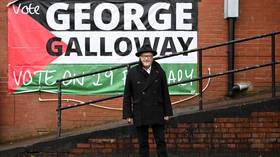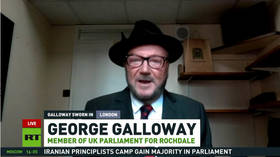George Galloway is not a threat to democracy – only to the elite hypocrites running the UK

Last week’s exchange of insults between newly elected MP George Galloway and Prime Minister Rishi Sunak highlighted the festering political divisions that have recently emerged in Western democracies over the ongoing conflict in Gaza.
Their vituperative exchange also made clear that rational debate over Gaza is virtually impossible in those Western nations in which both major political parties uncritically support America’s pro-Israel foreign policy in Gaza.
Debates over domestic culture war issues in the West have for decades been characterized by irrationality, demonization of opponents, the abolition of history, and the refusal to acknowledge the right to express a view contrary to dominant woke ideologies.
Within such a neo-totalitarian intellectual culture, it would be foolish to expect that a debate over a historically contentious issue like Gaza could be conducted rationally.
Nevertheless, last week, Galloway won a by-election in Rochdale, a poor Midlands electorate in the UK formerly held by the Labour Party.
It was an astounding and comprehensive victory. Galloway received 12,335 votes – over 40% of the votes cast – while the Conservatives gained 3,731 votes, and Labour, 2,402.
Galloway labeled his win as “a thumping victory” over both major parties – and he described Keir Starmer and Sunak, in characteristically provocative fashion, as “two cheeks of the same backside” that he had just “spanked.”
Galloway is a controversial and charismatic political figure. He is a former Labour and Independent MP who courageously opposed Tony Blair and George Bush’s war against Iraq, and he has been a trenchant defender of the Palestinian cause for decades.
In the Rochdale by-election – an electorate with a Muslim population of around 30% – Galloway focused his campaign on calling for an immediate ceasefire in Gaza.
In the UK, the Gaza conflict has become a deeply divisive political issue over the past six months. During that time, more than 30,000 people have been killed by the Israeli military, most of them civilians and many of them women and children.
Many citizens in the West – to their credit – have refused to turn a blind eye to the distinction between terrorists and civilians, and the humanitarian crisis that America’s continuing support for the Netanyahu government has created in Gaza.
It cannot be disputed that America’s persistent refusal to support a ceasefire in Gaza has resulted in the deaths of thousands of innocent Palestinian civilians.
In the UK and Australia, the governments and major opposition parties have, up until now, resolutely supported America’s stance and refused to call for an immediate ceasefire. In these countries, it has fallen to minor left-wing parties to oppose America’s position – in the UK, it has been Galloway’ Workers Party, and in Australia, it has been the Greens.
But principled opposition to America’s Gaza policy does not end there.
Deep-seated divisions have emerged within the Democratic Party in America, the Labour Party in the UK, and the Labor government in Australia – as a result of significant segments of these parties strongly opposing the stance on Gaza taken by US President Joe Biden, UK Labour leader Keir Starmer, and Australian Prime Minister Anthony Albanese.
The British parliament recently descended into complete chaos when Starmer pressured the speaker of the House of Commons to breach parliamentary convention and prevent debate over a Scottish National Party (SNP) motion calling for an immediate ceasefire in Gaza.
If the SNP motion had been permitted to proceed, at least 60 Labour MPs would have voted in favor of it – thereby provoking a serious political crisis for Starmer and his Labour Party.
Recent polls in the UK suggest that 65% of voters are in favor of an immediate ceasefire in Gaza. It is this popular sentiment – together with the large number of Muslim voters in the electorate – that enabled George Galloway to achieve his stunning victory in Rochdale last week.
In his victory speech, Galloway said, “Keir Starmer, this is for Gaza. You will pay a high price for the role that you have played in enabling the catastrophe presently going on in Gaza.”
He went on to say that “the misnamed Labour Party” has “lost the confidence of millions of their voters,” and that “the plates have shifted tonight.”
Galloway took pride in the fact that both major parties had been “well and truly spanked” and “thoroughly and soundly beaten” on the issue of Gaza.
He vowed to get rid of the Rochdale Labour Council in the council elections next month, and foreshadowed standing candidates in the upcoming general election with the aim of defeating Labour candidates.
Whether Galloway will be able to win other seats in the general election is doubtful – Rochdale is an atypical electorate, which is why he ran there – but he has certainly tapped into widespread popular discontent with the major parties’ position on Gaza.
Galloway also won over traditional Labour voters disenchanted with Starmer’s elite, woke-oriented Labour party – which has spent the last few years driving old-style working-class leaders like Jeremy Corbyn out of the party.
In an interview with Sky News after his victory, Galloway turned his attention to Sunak, who he described as “a rather diminutive, diminished and degraded politician” who is “in the fag end of his Prime Ministership.”
He said bluntly, “I despise the Prime Minister… as do millions of people in this country.”
Galloway reiterated that he had “a democratic mandate” and that he looked forward to taking his place in the House of Commons.
The following day, in an extraordinary address to the nation delivered outside 10 Downing Street, Sunak responded to Galloway’s electoral victory.
He began by describing Galloway’s win as “beyond alarming” – an odd comment from an unelected prime minister who is supposedly committed to democracy.
Sunak painted a picture of pro-Palestinian protesters engaging in “extremist disruption and criminality.” These people, according to Sunak, were “spreading a poison” and “trying to tear us apart.” Democracy itself is apparently “under threat” from extremists who “want to destroy our confidence and hope.”
He claimed that “MPs do not feel safe in their homes” and vowed to order the police to clamp down on extremism. “The time has now come for us all to stand together to combat the forces of division,” he urged. The hypocrisy and cynicism are simply breathtaking.
For decades, the Conservative Party has promoted cultural diversity as a positive good, in order to win over ethnic groups to the Conservative cause, and stave off much needed economic and political reform.
But acceptance by the Tories was never absolute – it was always conditional upon ethnic groups uncritically adopting the values and world view of the elites that govern the UK, many of whom have been sitting on the Tory benches for the past decade or so.
Benefits and privileges were showered on talented individuals from ethnic groups who acquiesced in this sordid arrangement. The Conservative Party today is full of such people – Sunak himself is a classic example, as is former Home Secretary Suella Braverman.
Those ethnic groups, however, who oppose elite ideologies – even by dint of exercising their democratic right to vote in elections – soon find themselves demonized and cast out of what Sunak calls Britain’s “multi-ethnic and multi-faith democracy.”
Sunak and his Conservative supporters have now cynically decided that it is time to cast British Muslims out of the fold – for daring to protest over what is happening in Gaza.
Yesterday, Conservative politician Jacob Rees-Mogg criticized the Muslim voters of Rochdale for “allowing religion to determine votes in UK politics.”
Is the Church of England no longer the established church in the UK? Do 26 of its bishops no longer sit by appointment – rather than election – in the House of Lords? Don’t Rees-Mogg and other Conservative politicians bang on about Judeo-Christian values in political argument on a regular basis?
Conservative politicians also bemoaned the fact that a foreign policy issue has now seemingly defiled domestic politics for the first time in British history. Did the Crimean War not become a domestic political issue? The Boer War? World Wars I and II? Suez? Vietnam? Kosovo? Iraq? Afghanistan? It appears not.
And are we to seriously believe that, up until the recent pro-Palestinian protests, political protests in Britain have never attracted some extremist elements.
A former Conservative politician yesterday quite correctly described the Conservative Party’s response to Galloway’s electoral victory as “a toxification of political culture.”
Not surprisingly, more pro-Palestinian protests have been scheduled for this weekend.
Sunak’s belated and cynical embrace of the politics of division will not save him. Committed right-wing members of his own party who have nothing but contempt for him, the most notable being Braverman, as well as minor parties further to the right of the Conservatives, have already condemned him for his hypocrisy and for not going far enough. Sunak does, however, have a staunch supporter in Starmer, who said that he was “right to advocate unity.”
Sunak’s ill-advised and pathetic speech can only create further division and social unrest within the UK. Precisely how demonizing British Muslims and spreading rank prejudice will promote ‘unity’ is not readily apparent.
Weak governments and political parties that uncritically support flawed American foreign policies very often pay a heavy price for doing so.
Sunak’s Conservative Party has been slowly cannibalizing itself for over a decade, and Gaza has just sped up the process of its self-destruction. As for Starmer’s Labour Party, it remains to be seen what price it will pay for cravenly supporting the collapsing American Empire and one of its proxy states.
Galloway has resurrected his political career by opposing America’s policy on Gaza on a principled basis.
Whether he will be able to engender a rational debate in the House of Commons over Gaza – and bring about a change in UK policy – are open questions at the moment. One thing is certain however – George Galloway will definitely give it his best shot.
The statements, views and opinions expressed in this column are solely those of the author and do not necessarily represent those of RT.














